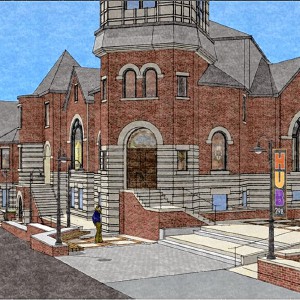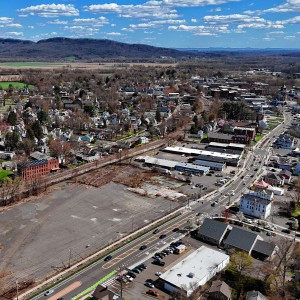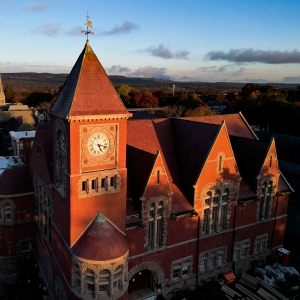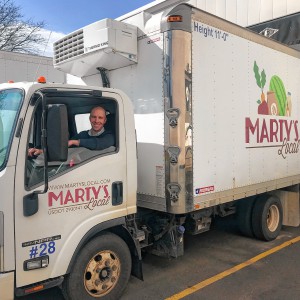Making a musical home: New album celebrates the work of immigrant jazz musicians
| Published: 06-15-2023 3:34 PM |
In 2019, Felipe Salles put the finishing touches on an ambitious project: an extended composition that blended jazz, Latin American music, and classical elements, all of it based on interviews he’d conducted with younger immigrants about what it was like to grow up in the U.S.
The album and the live performances based on it, called “The New Immigrant Experience,” had deep personal relevance for Salles, a saxophonist and composer who was born in Brazil but came to the U.S. in his 20s. Today he lives in Northampton and teaches in the jazz program at the University of Massachusetts Amherst.
Now Salles has completed a follow-up project built on somewhat similar thematic lines. His new album, “Home is Here” on Tapestry Records, celebrates the contributions some of his fellow immigrants in the jazz community have made to America’s musical melting pot.
Conducting the 19-member big band he leads, The Felipe Salles Interconnections Ensemble, Salles has created eight new extended compositions, each of them written for and inspired by a specific guest musician, who then performs a solo on that piece.
The new album, which runs a little under 73 minutes, followed Zoom interviews Salles conducted with the eight soloists, most of whom now live in New York City. During the talks, he asked them about their background, their experience coming to the U.S., and their musical careers.
Among the performers are some storied names, such as Paquito D’Rivera, a Grammy winning Cuban-American saxophonist and clarin etist, and Jacques Schwarz-Bart, an acclaimed Caribbean-French saxophonist.
“There’s a bit of anthropological interest and curiosity I brought to those interviews,” Salles said during a recent phone call. “I also wanted to know how they viewed their own artistic identity.”
He and his ensemble will debut the music Saturday, June 17, at 7 p.m. at the Bombyx Center for Arts & Equity in Florence. The group will also play the new compositions June 22 at The National Sawdust in Brooklyn, New York.
Article continues after...
Yesterday's Most Read Articles
 More than 130 arrested at pro-Palestinian protest at UMass
More than 130 arrested at pro-Palestinian protest at UMass
 Public gets a look at progress on Northampton Resilience Hub
Public gets a look at progress on Northampton Resilience Hub
 Northampton bans auto dealerships near downtown; zone change won’t affect Volvo operation on King Street
Northampton bans auto dealerships near downtown; zone change won’t affect Volvo operation on King Street
 UMass basketball: Bryant forward Daniel Rivera to be Minutemen’s first transfer of the offseason
UMass basketball: Bryant forward Daniel Rivera to be Minutemen’s first transfer of the offseason
 Town manager’s plan shorts Amherst Regional Schools’ budget
Town manager’s plan shorts Amherst Regional Schools’ budget
 Police respond to alcohol-fueled incidents in Amherst
Police respond to alcohol-fueled incidents in Amherst
In an interview, Salles says he wasn’t looking to take on another musical project specifically connected to immigration after he concluded “The New Immigrant Experience,” which had been a labor-intensive effort funded largely through his winning a Guggenheim Fellowship.
Salles had based that work on the experiences of several “Dreamers”: young immigrants who had been granted legal status in the country after being brought to the United States as children and raised by undocumented parents.
“After I finished that, I was wondering, ‘What can I do next?’ ” Salles said. “What would be another way of honoring the jazz community? I wasn’t really sure.”
In fact, though, Salles had already created something of a template with a previous album he produced with his Interconnections Ensemble, “The Lullaby Project,” a 2018 recording that reflected his own life journey, with arrangements of traditional lullabies from Brazil.
D’Rivera, who he knew, had contacted him after “The Lullaby Project,” telling him he’d loved the album and would be interested in working with him in the future.
Remembering that, and considering other immigrant musicians he knew and had worked with, got Salles to thinking about a new project that would provide a broad showcase for their music — and that could serve as the last of a trio of thematically linked albums.
“It’s funny, because I tend to do other projects as a series of three,” he said. “But that’s not how I planned this. It just happened this way.”
In any event, the Interconnections Ensemble is a good forum for capturing the range of music Salles has composed for “Home is Here,” which embraces sounds from several nationalities, cultures and traditions: Brazil, Mexico, Argentina, Cuba and more.
The ensemble is made up of five trumpet/flugelhorn players; four trombone players; five woodwind players (saxophone, clarinet and flute); and a rhythm section of piano, drums/percussion, guitar, bass and vibraphone.
That makeup, Salles notes, gives him the flexibility to write longer compositions that include multiple musical elements, from American jazz to Brazilian folk music to Latin American rhythms and classical touches.
The album’s uptempo opener, “Re-Invention,” for instance, which showcases D’Rivera on clarinet and then alto saxophone, has elements that hint at Bach, but more broadly transitions through a number of Latin styles such as tango, Afro-Cuban and Brazilian Choro.
“Polymorphous,” the third track, includes bursts of brass and punchy percussion, and it features an expressive solo by Schwarz-Bart, who brings his own eclectic tastes to the composition.
Born in Guadeloupe, Schwarz-Bart, also known as “Brother Jacques,” attended Boston’s Berklee College of Music and has won praise for reconnecting jazz with its Afro-Caribbean and spiritual origins.
Salles also reunites with a childhood friend, Brazilian guitarist Chico Pinheiro — he now lives in New York — on “The Promise of Happiness,” which features a saxophone solo by Salles and some melodic guitar work by Pinheiro.
“It was really nice to play with Chico again,” Salles said. “His style mixes with mine. We go back a long ways — we used to practice together.”
The album doesn’t just showcase instrumentalists. Megos Herrera and Sofia Rei, originally from Mexico and Argentina, respectively, contribute vocals on the slower compositions Salles wrote for them, “Two Worlds Together” and “Meridian 63.”
And Salles pays tribute to Nadje Noordhuis, a flugelhorn player who’s part of a sextet he heads. Noordhuis, a native of Australia, adds a lyrical solo to “Wanderlust,” another uptempo number that brings in touches of pop, R&B and swing.
“This turned out to be a great project to work on,” Salles said.
The album was recorded in two days in Connecticut last spring, with some of the artists making remote contributions as well. “There was no downtime,” he said with a laugh.
Even so, it was a productive time. As All About Jazz says about Salles’ new album, “The composer clearly knows how to tap into the distinctive gifts of his talented partners, both new and familiar, and his latest release is a fine example of his supremely collegial instincts.”
More about Felipe Salles’ music can be found at sallesjazz.com.
Steve Pfarrer can be reached at spfarrer@gazettenet.com.

 Speaking of Nature: Capturing my Bermuda nemesis: The Great Kiskadee nearly evaded me, until I followed its song
Speaking of Nature: Capturing my Bermuda nemesis: The Great Kiskadee nearly evaded me, until I followed its song Easthampton author Emily Nagoski has done the research: It’s OK to love your body
Easthampton author Emily Nagoski has done the research: It’s OK to love your body Earth Matters: Honoring a local hero: After 40 years, Hitchcock Center bids farewell to educator and creative leader, Colleen Kelley
Earth Matters: Honoring a local hero: After 40 years, Hitchcock Center bids farewell to educator and creative leader, Colleen Kelley Valley Bounty: Delivering local food onto students’ plates: Marty’s Local connects farms to businesses
Valley Bounty: Delivering local food onto students’ plates: Marty’s Local connects farms to businesses
